The stereotype of the stern woman who haunted the library—the one with the bun, the frown, and the finger pressed to her lips—bears little resemblance to today’s librarians. This generation of librarians is leading some of the most important conversations of our times. And they want to get you talking.
By Marybeth Reilly-McGreen
117 West from I-95 North will get you to the West Warwick Public Library by way of Suited Devils Ink tattoo parlor, AJ’s Restaurant, Valley Fuel, and Henault-Gallogly Funeral Home.
Incorporated in 1913, West Warwick, R.I., is the youngest town in the state, but it has a worn appearance that hints of hardship. The Riverpoint Congregational Church advertises a rummage sale. There are no chic boutiques or tony coffee shops. Jerry’s Supermarket proclaims itself the “King of Meats,” but it’s the old Royal Mill Complex, with its crenelated clock tower overlooking the Pawtuxet River, that ranks first for most imperious structure.
This town doesn’t likely benefit much from the $1.7 billion haul the Ocean State nets during tourist season. This is a town designed for business, not pleasure.
And if you were driving in the vicinity of the library at around 1 p.m. on Saturday, June 26, you might’ve seen that dilapidated pickup truck flying the Confederate and American flags from the back corners of its bed as it drove past the library. And if that were your destination, it might’ve made you uneasy. Because that day—a hot day for early June, with 89% humidity—the library was celebrating Pride Month by hosting Drag Story Time, a local version of the national Drag Queen Story Hour, in which professional drag queens read aloud to children and their parents at libraries, bookstores, and schools with a view to destigmatizing gender fluidity. And that had some people upset. In the weeks leading up to the event, two local priests demanded it be canceled. Other residents voiced their anger on social media.
“Librarians are unsung heros. The stereotype that persists is that we’re just the keepers of the books. We’re so much more.”
–Mary Moen
Though committed to holding the event—conceived of and organized by West Warwick Public Library staff members Rashaa Al-Sasah, M.L.I.S. ’17, head of youth services, and Emma Brelsford, ’19, M.L.I.S. ’21, youth services librarian—the library’s director, Colin McCullough, M.L.I.S. ’16, felt compelled to make a formal statement on the library’s website. The drag story hour’s message is that people shouldn’t be bullied or teased for what makes them different, wrote McCullough. “We recognize that not every program we offer matches the interests or the values of every member of our community and patrons may or may not attend at their own discretion.
“We will, however, continue to ensure that issues of equity, diversity, and inclusion inform and enrich everything that we do,” McCullough continued. “Our message is simple—libraries are for everyone.”
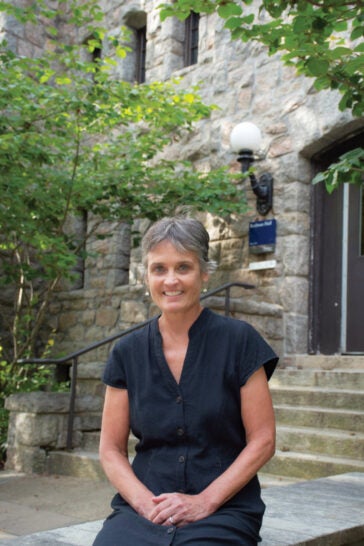
It’s a common refrain among librarians, or at least among URI’s Graduate School of Library and Information Studies (GSLIS) alumni. Their career paths are anything but similar, and they hardly personify the stereotypical librarian. URI’s accelerated, online, American Library Association-accredited GSLIS program prepares students for careers in public and school libraries, archival work, and medical and law libraries, among other things. The program trains librarians for the diverse audiences they’ll serve, say the program’s director, Valerie Karno, and assistant professors Melissa Villa-Nicholas and Mary Moen, M.L.I.S. ’03, Ph.D. ’15. It is nimble and topical, making issues of social justice, equity, and information literacy part of its curriculum and mission.
“Librarians are unsung heroes. The stereotype that persists is that we’re just the keepers of the books. We’re so much more,” Moen says.
“We’re exploring how to bring activism and scholarship into librarianship; we want to go further with social justice in library and information studies,” Villa-Nicholas says.
Karno characterizes librarians as superheroes springing into action against the villainous triumvirate that is COVID-19, racism, and fake news. “Librarians all over the country have pivoted to provide crucial community services during this pandemic. Last spring, we had the speaker series, ‘Voices of Information Equity,’ which was very well attended,” Karno explains. “What we are trying to do is fundamentally support the field of information professionals, information curators, and libraries all over the country as our alumni come from and go into all kinds of fields.”
Read on to learn how GSLIS graduates are preserving history, leading community conversations, enriching the lives of children and the elderly, elevating historically underrepresented voices, supporting academic scholarship and lifelong learning, and helping people find what they need in an atmosphere that makes them feel welcome. And heard.
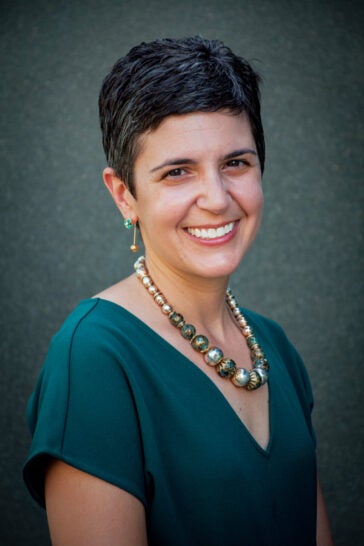
STEPHANIE MILLS
“I’m a beg-borrow-and-steal librarian. I’m always running the book fair and doing things to increase our budget when times are tough. The library is for everyone, and that means having a broad range of titles.”
Rhode Island’s 2020 School Librarian of the Year, Stephanie Mills ’03, ’09, M.L.I.S. ’07, looks at the honor as something of a vindication. “It verifies and solidifies for me the important role of school libraries,” she says. “The library is the heart of the school; it’s the hub, the place that brings together a community of readers.”
Interest in reading wanes in middle school when children’s parents stop reading to them, Mills, school librarian at Park View Middle School in Cranston, R.I., notes. Her response has been to focus on information literacy and literature appreciation. School curriculums now include lessons on how to discern between fact and propaganda. Mills wants to encourage students’ desire to read by providing “choice and voice for students so that they’ll continue enjoying reading because they’ve found a good story. Not everything we do or teach has to be tied to a grade,” Mills says.
When COVID-19 caused schools in Rhode Island to close, Mills created pop-up libraries outside, rolling book carts around her school’s parking lot so students could check out books. “And I had a delivery service where I was running from room to room delivering what they’d requested through Google forms. So, we used modern technology to do a simple thing: Get books in the hands of the kids,” Mills says.
An unfortunate consequence of COVID-19, locally and nationally, has been the loss of library materials. Hundreds of library books are missing from Park View’s collection, in part because students haven’t been back to school in 18 months. Mills is replacing titles with grant money and with help from the school’s parent-teacher group. It’s not a one-for-one replacement of titles, though, Mills notes. Her purchasing decisions address broader concerns. “We have a diverse population, so I’m looking for books that represent diverse voices and are written by authors who are members of the marginalized populations they’re writing about,” Mills says. Mills has an evangelist’s zeal for her profession. “I am as enthusiastic today about doing this job as I was when I started,” she says. “And I think that’s a measure of how great the profession is.”
Good Read:
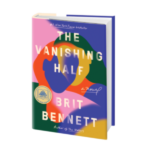
The Vanishing Half by Brit Bennett. Mills says, “It’s about Black twins growing up in a segregated area in the South. In their town, over time, the African Americans have become lighter. It’s something the people there are proud of. One of the twins decides to leave and pretend to be a white woman because the opportunities are so plentiful for her. But she has to shut out her family.”
Reference Desk: Americans check out an average of eight books a year. They spend $36.96 a year for the public library—about the average cost of one hardcover book.
—American Library Association
LARRY SPONGBERG
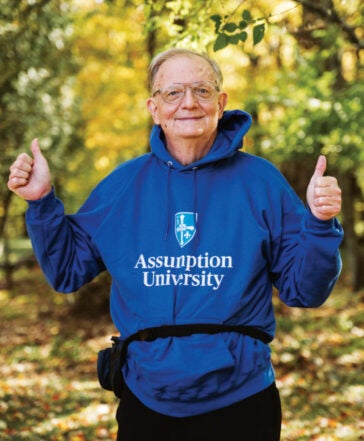
“It was loud. I can have a pretty loud voice, but it was loud. I don’t even think they could hear me. So, I climbed up on the table. I don’t think I was thinking of doing that when I first walked into the room, but it did get their attention very quickly.”
Larry Spongberg, M.L.S. ’75, has three dresser drawers full of mementos from his 40-plus years as a librarian at Assumption University’s Emmanuel d’Alzon Library in Worcester, Mass. Even in retirement, he can be relied upon to fill in as needed and to keep the library’s collection organized. Known as “Larry the Librarian” to the students of Assumption, Spongberg’s energy and way with students grew into legend. He’d ply them with puns and once even climbed onto a table to quiet a room. “I only had to stand on it that one time, which is good because it wouldn’t have had the same shock value later,” he says. “And I never noticed that it got that loud again.”
“Libraries are places where people should feel welcomed and encouraged to ask questions.”
–Larry Spongberg
“So, it was ironic that during my first year I became known for quieting down that group that time, because that was against my inclinations.
“Libraries are places where people should feel welcomed and encouraged to ask questions,” Spongberg says. “I’d always hoped to be able to help people and deal with the public. Being a librarian enabled me to do that. Tremendously.”
Spongberg studied history in college. It was his aunt, a town librarian, who encouraged him to consider library school. “But back when I was a college student, librarians had the reputation of being people who wanted to collect fines and tell other people to be quiet. My friends said, ‘Why would you want a job where you just go around telling everybody to shut up?’
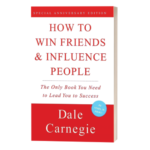
Good Read:
How To Win Friends & Influence People by Dale Carnegie. Spongberg says, “I found great ideas about how to relate to people, which helped me in my career.”
Ed Garcia
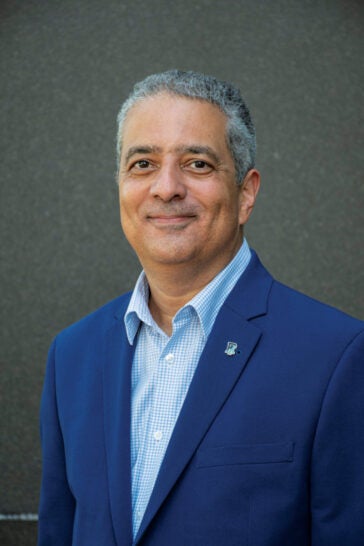
“Libraries are a trusted space.”
A decade out of college, Ed Garcia ’03, M.L.I.S. ’08, wanted a change. A history major who deejayed for WRIU, Garcia worked for Sony Music then fundraised for nonprofits. Michael Havener, then-director of the GSLIS program, convinced him to become a librarian.
“Dr. Havener showed me librarians can do so much more than people think,” says Garcia.
“The year I graduated, 2008, the economic meltdown started. I spent most of my day helping people search for jobs. Public libraries can be a safety net for people who may not have the skills or the access to information or technology,” Garcia says.
A recipient of the GSLIS 2018 Alumni of the Year award, Garcia has been active in the American Library Association (ALA). In 2010, he was the first URI graduate named an ALA Emerging Leader.
These days, Garcia, director of the Cranston (R.I.) Public Library, and his team are focused on equity issues regarding everything from the purchase of e-books to naming conventions around collections. “We are building inclusive collections that reflect our community, which includes examining how materials are cataloged in our collections. The Dewey Decimal System, a Western, white male-centric system, does not reflect the diversity of our communities. We started by changing the subject heading ‘illegal aliens’ to ‘undocumented immigrants.’ We had GSLIS intern Tessa Mediano work with our cataloging librarian, Christine Hall ’03, M.L.I.S. ’14, to look at the subject headings and call numbers of our Native American collections. We created subject headings for all local tribes, rather than grouping them all under the heading of ‘North American Indians.’”
Libraries also provide potentially life-altering services, Garcia says. The Cranston Public Library has served patrons from more than 33 countries; conducted classes in English as a second language, citizenship, and computers; served free lunches to children during school vacation; and hosted diversity, equity, and inclusion training.
“We’ve had a lot of discussions on racial equity, climate change—a lot of topics,” Garcia notes. The library is a safe space that is trusted by the community.”
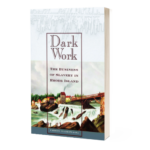
Good Read:
Dark Work: The Business of Slavery in Rhode Island by Christy Clark-Pujara. Garcia says, “Even after Rhode Island outlawed slavery, the business of slavery was happening here. This book goes into depth about a forgotten part of our state’s history.”
Reference Desk: 73% of public libraries assist patrons with job applications and interviewing skills.
68% of public libraries help patrons use databases to find career openings.
77% of public libraries offer health resources.
—American Library Association
Ashley Selima
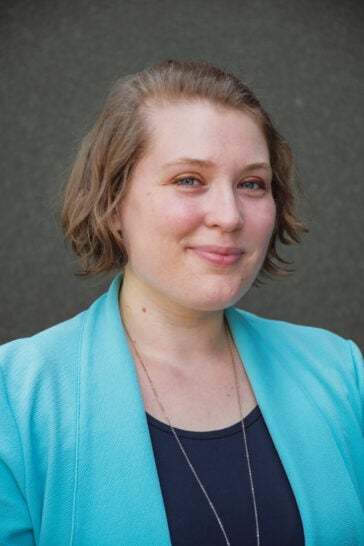
“Every day in the archives is a unique experience. Any job is going to have its moments when you’ve had one too many meetings for the day, but how many people can duck into a vault and look at the Bill of Rights?”
Sifting through public records might seem like dull work, but those documents can bring history to life, says Rhode Island state archivist and public records administrator Ashley Selima, M.L.I.S. ’12, M.P.A. ’13. In 2020, before COVID-19 derailed traveling exhibitions, Selima was putting together a traveling exhibition celebrating the centennial of the passage of the 19th Amendment granting women the right to vote. In her research, she found a record, circa 1919, from the president of the National Suffrage Association. “She wrote to a Southern congressman that if he wanted to keep his white majority, he should let white women vote in order to keep segregation in the South—that it benefitted him to give women more rights, but only white women.
“Helping people become more civically engaged is rewarding.”
–Ashley Selima
“As a woman looking back 100 years at these women I’ve always seen as heroes—their work means I get to vote in my presidential election—I see there’s a reality to history that we can only learn from these handwritten documents, which show the true complexity of people and, sometimes, the dark side of history. That moment solidified for me the importance of what we do as archivists: We preserve history that doesn’t always want to be seen, but needs to be seen.”
Other aspects of the job bring joy, though, Selima says. “Being a small part in helping people become more civically engaged is a really rewarding thing.”
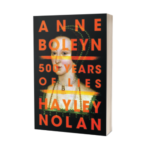
Good Read:
Anne Boleyn: 500 Years of Lies by Haley Nolan. Selima says, “She’s one of the most maligned women in history. I’ve always been fascinated by Tudor history. I heard about this book on the podcast, You’re Wrong About.”
Reference Desk: College libraries receive less than 3 cents of every dollar spent on higher education.
—American Library Association
David Kelsey
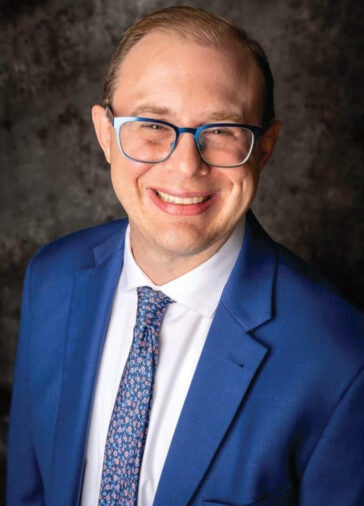
“We serve everybody, every single person that comes into our library, no matter their background or values. And that is the beautiful thing about a library: We’re inclusive.”
David Kelsey, M.L.I.S. ’12, outreach services librarian at St. Charles (Ill.) Public Library and 2021 president of the Association of Bookmobile and Outreach Services, cherishes vivid memories of his childhood trips to the library. “My mother would take me to the Wheaton (Ill.) Public Library once a week during the summer. We’d spend hours just looking at books. “The books that really got me reading were the Harry Potter books. My friends and I would pretend we were in Harry Potter, and the stories would magically come to life.”
Library school was the perfect fit and URI, an adventure, Kelsey says. A recipient of URI’s 2019 GSLIS Alumni of the Year award praises the program. “I had opportunities that I wouldn’t have had anywhere else. It makes my heart happy to see all the great work they’re doing for the next generation of librarians.”
Kelsey’s education and experience reinforce his belief that a library has a civic responsibility for inclusiveness. He supervises an outreach team whose specialty is serving library patrons living in senior facilities. His was the first library in the country to do virtual programming for senior facilities during the pandemic. To hear Kelsey speak of his work is to realize the event is incidental; it’s the effect that matters. “Seniors can be a forgotten population, but they are still patrons and part of our library family. Just because they can’t come to the library doesn’t mean the library shouldn’t come to them.”
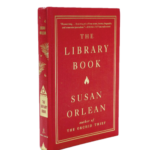
Good Read:
The Library Book by Susan Orlean. Kelsey says, “It’s thoroughly fascinating and speaks to libraries’ uniqueness. My mother just finished it, and she thought the history of libraries would be helpful to me.”
Reference Desk: Public libraries offer 4.3 million programs a year, and 95% provide online homework assistance and summer reading programs for children.
—American Library Association
Lisa Villa
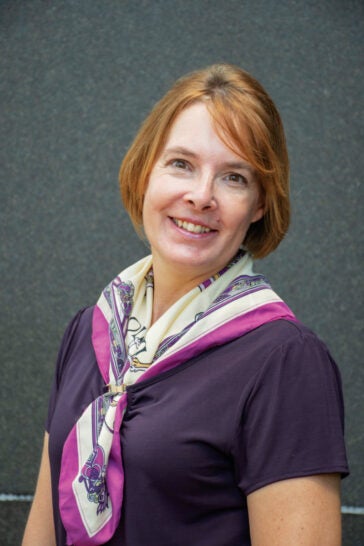
“The idea of open access is to reduce the barriers to authors sharing their work because they want to keep their field moving forward and to spread their knowledge.”
In 2013, with neither blueprint nor formal guidance, Lisa Villa, M.L.I.S. ’95, digital scholarship librarian at College of the Holy Cross’ Dinand Library (Worcester, Mass.), was tasked with building the digital equivalent of a cathedral. She undertook the creation of a digital archive, an open-access institutional repository with an ambitious aim: to advance research and scholarship at Holy Cross, while also creating a historical record readily accessible and responsive to all inquiries. The archive would be flexible and capacious enough to contain the college’s output of scholarly articles and publications, reports, research, and creative works—in effect, a repository of significant contributions to the institution’s overall intellectual capital.
Now nearing 5,000 items, the CrossWorks repository holds, among other things, the student literary journal, The Purple, to which two-time U.S. poet laureate Billy Collins was once a contributor; the only known model of the East Indiaman ship, Earl of Abergavenny, an 18th-century ship captained by poet William Wordsworth’s brother, John, who died when the ship sank off the coast of England in 1805; an oral history of LGBTQ students’ experiences at the college; and copies of scrapbooks kept by former Boston mayor and Massachusetts governor James Michael Curley.
But the benefit goes beyond preservation, Villa says; the archive is a valuable teaching tool for the school’s next generation of scholars. In her role as digital scholarship librarian, Villa talks to students about the scholarly communication process, copyright, and open access. “Faculty understand CrossWorks’ value and now they’re encouraging their students to submit—not so that they get 100 hits on their English paper, but because many of them will go on to do graduate work and they are just that much more primed for the quality of research they’ll be expected to produce.
“When students are aware that they’re writing for a global audience, they tend to approach their work differently. They’re no longer just writing a paper. They’re writing a paper that will be seen—and possibly critiqued and used—by other people, and that knowledge raises the level of output.”
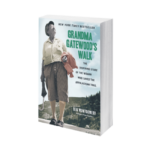
Good Read:
Grandma Gatewood’s Walk: The Inspiring Story of the Woman Who Saved the Appalachian Trail, by Ben Montgomery. Villa says, “I couldn’t put it down. I had never heard of Gatewood, and now I want everyone to know about her—especially since the Appalachian Trail runs through New England.”
Reference Desk: Reference librarians in the nation’s public and academic libraries answer nearly 6.6 million questions weekly.
—American Library Association
Colin McCullough
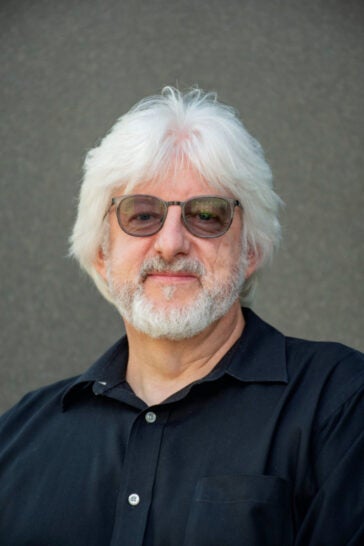
“Libraries are engines of social justice.”
Becoming a librarian was a career change for Colin McCullough, M.L.I.S. ’16, director of the West Warwick (R.I.) Public Library, who previously worked for a humanitarian aid organization. He thought he’d become an academic librarian and worked at the Robert L. Carothers Library and Learning Commons while he was a student in URI’s GSLIS program. But working in the Knight Memorial Library in South Providence, one of the poorest communities in Rhode Island’s capital city, changed his mind. “I loved the part the library played in the community, so when the West Warwick job came up, there were similarities that attracted me,” he says.
“We’re functioning as a community center almost as much as a library,” McCullough muses. Awareness of this influences the staff’s purchasing and programming decisions. In West Warwick, for instance, a menstrual health program where free products are distributed might well benefit the community more than a reading by a best-selling novelist. “How do you make those programming decisions? Is it underpinned by social justice in some way?” McCullough asks, answering with certainty, “Yes.” He continues, “My personal feeling is that libraries are engines of social justice. Anyone can walk through our doors.”
McCullough recalls an anecdote from early in his career. A middle-aged woman came into the library. English wasn’t her first language, and she needed a résumé to apply for a factory job. They spent an hour writing the résumé and cover letter and uploading it to the company website. “I thought, ‘Well, something’s been accomplished here. You know, maybe she’ll get the job.’ I got as much out of that as she did because I had the sense that I was actually making a difference.”
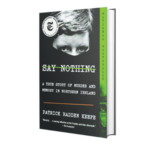
Good Read:
Say Nothing: A True Story of Murder and Memory in Northern Ireland by Patrick Radden Keefe. McCullough calls it “a well-researched and nuanced picture of the troubles in Northern Ireland. In a wider sense, it’s insightful on the effects of hatred and the futility of violence.”
Members of the Parasol Patrol at the West Warwick Public Library’s Drag Story Time in June.
Back to the West Warwick Public Library’s Drag Story Time: That Saturday, McCullough stood outside between the two groups that had formed at the library despite the oppressive, wet heat. The protesters claimed the lawn facing Main Street. One of the priests arrived. A sole protester marched back and forth yelling, “Stop sexualizing our children!” But otherwise, the group was quiet.
A second larger group set up beach chairs in the library’s small parking lot and brought coolers filled with water and ice pops. Some wore adult-sized butterfly wings or carried rainbow umbrellas—these were members of the Parasol Patrol, adults whose fashion choices function to shield children from the angry protestors. Others wore T-shirts identifying themselves as members of Free Mom Hugs, a group that supports LGBTQ+ people by offering hugs at Pride parades. Some of the winged ones spread their wings and shimmied a bit to the Lady Gaga music pumped in from a house across the street. A pair of policemen made small talk with one another.
But nothing much else happened.
Even that day, there were more people in favor of the event than against it, McCullough noted afterward. “And on Facebook, you’ll see that there was overwhelming community support and people saying things like, ‘We should try to have a Pride parade here.’ In some sense, we’ve kind of opened a door, you know?
“What I see that event doing is leading the conversation and setting the tone for how librarians and libraries are performing functions that extend beyond the circulation desk,” McCullough says. “To me, dialogue and communication are good things.” •
Marybeth Reilly-McGreen is a URI content strategist and frequent contributor to URI Magazine. An award-winning writer, she has profiled Dr. Anthony Fauci; poet laureate Billy Collins; Peabody Award- winners Christiane Amanpour ’83, Hon. ’95, and Vlad Duthiers ’91, Hon. ’17; Pulitzer Prize- winner Thomas Farragher ’73, Hon. ’17; and Tony Award- winner Andrew Burnap ’13.
PHOTOS: Nora Lewis, courtesy Larry Spongberg, David Kelsey, and Marybeth Reilly-McGreen

Thank you for this article. I graduated from the GSLIS in 2015 – I had dedicated professors and great classmates. Now I work at the Worcester Public Library, where I have wonderful colleagues.